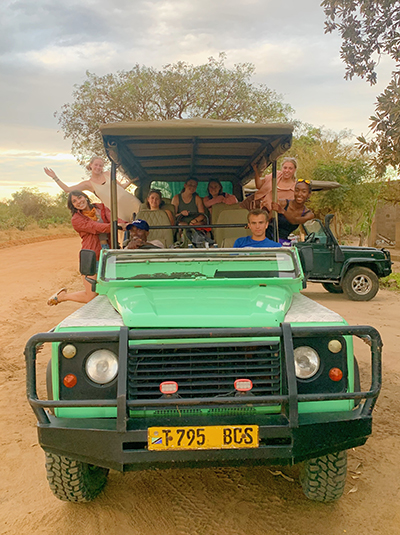
|
Campus ChampionJunior psychology major Vincent Aquino, president of the SUNY Cortland Pride Club, will present at the sixth annual TransAction conference on Friday, March 1. He’s on a panel geared to new teachers titled “Exploring Gender Identities in LGBTQIA+ Children’s Books.” “There’s a legal and cultural war against gender diverse individuals and what is taught here has an effect on the world,” said Vincent. His message: let’s teach diversity with care and compassion. The Pride Club and the conference welcome everyone, including allies, to attend their events. “It’s very important to me that people see us as we celebrate and show queer joy.” Tuesday, Feb. 20Division of Finance and Management Open Campus Meetings: Overview of SUNY Cortland’s financial state and the university’s budget, Park Center, Room 1118 C-Club Hall of Fame Room, 10 to 11 a.m. Dialogues with International Faculty and Staff: Conversation with John Jones, Childhood/Early Childhood Education Department, Sperry Center, Room 104, 4:30 to 5:30 p.m. Black History Month Wheel of Fortune: Hosted by the Black Student Union, Corey Union, Room 301, 6 p.m. Wednesday, Feb. 21Sticks & Stones: Understanding Implicit Bias, Microaggressions and Stereotypes: Presented by United University Professions and NYSUT, Park Center Hall of Fame Room, Room 1118, 8:30 a.m. to 12:30 p.m. Light breakfast and lunch will be provided. Black History Month Sandwich Seminar: Black Politics in the Contemporary Moment, presented by Mecke Nagel, Philosophy and Africana Studies departments, Old Main Colloquium, 12:30 to 1:30 p.m. Division of Finance and Management Open Campus Meeting: Overview of SUNY Cortland’s financial state and the university’s budget, with updates on campus reserves and allocation of resources, Sperry Center, Room 105, Vittor Lecture Hall, 2 to 3 p.m. Brooks Museum Lecture Series: Empowerment through Sport and Fitness, Moffett Center, Room 115, 4:30 p.m. A reception to welcome our speaker begins at 4 p.m. in the Brooks Museum, Moffett Center, Room 116. Get Resume Ready: Presented by Career Services, online via Webex,4 to 5 p.m. Pre-register for more information on Handshake. Physical Accessibility on Campus Focus Group: Hosted by the Disability Resources Office, Corey Union Fireplace Lounge, 5 to 6 p.m. Please RSVP. Braiding Sweetgrass Book Club: Corey Union, Room 209, 7 to 8 p.m. Body Appreciation Week Lecture: “Loud in the House of Myself,” with Stacy Pershall, author and speaker from Active Minds, Corey Union Exhibition Lounge, 7 to 8 p.m. Thursday, Feb. 22NIRSA Rec Day at the Student Life Center: Student Life Center, 6 a.m. - midnight, events all day, including raffle tickets and free t-shirt giveaways. Body Appreciation Week: Chocolate Meditation, Neubig Hall lobby, 12:30 to 2:30 p.m. Re-Thinking Abilities Workshop: Online via Webex, 3 to 5 p.m. Black History Month Roundtable Discussion: Solidarity in Critical Times, explore the challenges of thinking and practicing solidarity in a politically volatile world, Old Main Colloquium, 4:30 to 5:45 p.m. Dowd Gallery Guest Speaker: Nancy Green, curator of American and European art emerita at Cornell University’s Johnson Museum, will present "They Came, They Created, They Conquered: A Short History of Women Artists in America," Dowd Gallery, 5 to 6 p.m. Musical Performance: The Last Five Years, a collaboration between SUNY Cortland’s Performing Arts Department and Cortland Repertory Theatre, Cortland Repertory Theatre’s downtown location, 24-26 Port Watson St., 7:30 p.m. Friday, Feb. 23Physical Accessibility on Campus Focus Group: Hosted by the Disability Resources Office, Corey Union Fireplace Lounge, noon to 1:30 p.m. Please RSVP. Teaching Braiding Sweetgrass: A Panel Discussion, Old Main Colloquium, Room 220, 4 to 5 p.m. Musical Performance: The Last Five Years, a collaboration between SUNY Cortland’s Performing Arts Department and Cortland Repertory Theatre, Cortland Repertory Theatre’s downtown location, 24-26 Port Watson St., 7:30 p.m. Cortland Nites: Murder Mystery Dinner, Corey Union Function Room, 8 p.m. Black and Boujee: Join the Black Student Union for their annual black and boujee party. Dress to impress, prizes awarded and masquerade masks provided, Corey Union Exhibition Lounge, 10 p.m. to 2 a.m. Saturday, Feb. 24Musical Performance: The Last Five Years, a collaboration between SUNY Cortland’s Performing Arts Department and Cortland Repertory Theatre, Cortland Repertory Theatre’s downtown location, 24-26 Port Watson St., 2 p.m. and 7:30 p.m. Sunday, Feb. 25Musical Performance: The Last Five Years, a collaboration between SUNY Cortland’s Performing Arts Department and Cortland Repertory Theatre, Cortland Repertory Theatre’s downtown location, 24-26 Port Watson St., 2 p.m. Monday, Feb. 26New York State Disability Services Council's 2024 Student Empowerment Day: Open to all SUNY Cortland students, a bus will be provided. Pick up is at 7 a.m. in front of Corey Union. We will return around 6 p.m. Legislative Office Building, Albany, 10 a.m. to 3 p.m. Please RSVP through Cortland Connect. Money Talks Monday - Financial Wellness: Online via Webex, 4 to 5 p.m. Wednesday, Feb. 28Understanding and Advocating for Racial Justice Workshops: Online via Webex, 4 to 6 p.m. Register. Thursday, Feb. 29Black History Month Sandwich Seminar: Challenge Accepted: Overcoming Bias, Prejudice and Racism One Day at a Time, Old Main Colloquium, noon to 1 p.m. Dowd Gallery Artist Talk: Minna Resnick will share personal experiences as an artist as part of "Eye Witness," an exhibition of fine art, Dowd Gallery, 5 to 6 p.m. Friday, March 16th Annual TransAction Conference: A one-day conference about the needs and experiences of transgender and genderqueer students in the university environment, Corey Union, 9 a.m. to 4 p.m., with some sessions online. For more information or to register please visit: TransAction Conference SUNY Cortland Cupboard: Filled Fridge Friday, pre-packed meals in the fridge, Old Main, Room B-05, 8 a.m.-5 p.m. Distinguished Voices in Literature: Van Burd Memorial Lecture, sponsored by the English Department, Old Main Colloquium, Room 220, 4:30 p.m. Saturday, March 2Cortland Nites: Make & Take, Corey Union Function Room, 8 p.m. Monday, March 4Safe Zone Workshop: Register for Safe Zone Workshop #2, Corey Union Fireplace Lounge, 4 to 6 p.m. |
SUNY Cortland introduces new major in tourism02/19/2024SUNY Cortland’s newest academic major in tourism and recreation will introduce students to life-changing experiences across the world and prepare them for a booming global industry. The new program also is unique within the State University of New York system. “There’s nothing quite like our focus on sustainable tourism,” said Kenneth Cohen, associate professor in the university’s Recreation, Parks and Leisure Studies Department and the faculty member who is leading the major. “When we talk about sustainability, we’re looking at the cultural, economic and environmental dimensions of tourism and balancing them together, so that (tourism) not only helps the economy but it improves the communities where it takes place.” In other words, SUNY Cortland’s take on tourism digs deeper than planning a vacation to Disney or snapping jaw-dropping sunset photos for Instagram. Over the past several years, Cohen has guided service-oriented trips to places like Hawaii and Tanzania in an effort to provide authentic insight into different cultures. The goal is to show students that effective tourism often involves an immersive learning experience, not merely postcard views. “Our students want to do some good in the world and they want to be job-ready,” Cohen said. “They want something that’s dynamic. They want to be outside, doing different things, working with different populations. They want variety. “They see the opportunities we offer and the things that we do, and suddenly it becomes clear that they can make a living in tourism – and a good one at that.” According to a 2023 economic impact report from the World Travel and Tourism Council, the U.S. travel and tourism sector grew by 16.9% in 2022, reaching $2 trillion in gross domestic product contributions. The travel and tourism sector also created 2.7 million more jobs that same year, compared to 2021. Cohen offered several examples of early career possibilities: working for a convention bureau or a local chamber of commerce; traveling the world with an international tour operation; or planning events that span everything from music festivals to weddings. The major’s coursework is designed to provide a set of foundational, transferrable skills in areas such as marketing, budgeting and risk management. “We want students to really reflect their interests,” Cohen said. “And through this major, they can turn those interests into an occupation.” He credited SUNY Cortland’s central location in New York state and its proximity to community-based operations that nurture sustainable tourism. Potential nearby locations for internships and service could include New York State Parks, Homer Center for the Arts, Lime Hollow Nature Center, Greek Peak Mountain Resort and many other travel destinations throughout the Finger Lakes region. But perhaps the program’s most distinctive aspect is an eye-opening travel opportunity that allows students to work with non-profit organizations as part of an immersive ecotourism course. Working with Growth International Volunteer Excursions (GIVE), a non-profit tour operator, Cohen has led several 10-day excursions in Hawaii and Tanzania during spring breaks and the university’s winter and summer sessions. Approximately 45 students have joined the trips so far. Their personal journal excerpts point to the type of transformational experience that come with effective tourism, with many students referring to it as the trip of a lifetime. Cortland groups have traveled to Hawaii to help restore fish ponds, a practice that allows natives to preserve their fish stocks across generations. In Zanzibar, Tanzania, students have worked with local schools to assist with an adult English language course. That training empowers parents in Tanzania to help their school-age children with English coursework and exams, which in turn helps both groups gain skills that can pay off for a lifetime. Cohen noted that students do not simply “parachute in” for a vacation; hybrid coursework prior to their travels introduces them to unique cultural aspects of the destinations they visit. “When we go into these communities, we travel responsibly,” said Cohen, who explored the Mediterranean region during his own studies. “A big part of that is understanding the customs and traditions. Through that, we’re able to go to places that other people don’t go. We’re invited on to sacred land. We’re invited to ceremonies. And we seldom see other tourists.
“That’s a foundational piece of all of our tourism initiatives — this cultural authenticity that is difficult to achieve. So, we’re very respectful and, in turn, we’re received with a great deal of hospitality.” He tells students enrolled in the course that their trip actually begins when they arrive home, in the ways that they are able to impart the lessons learned overseas and utilize them in local opportunities. SUNY Cortland students recently created a GIVE Club focused on service projects and sustainability. Members are not required to have taken the course and they do not need to be enrolled in the major. The club seeks to provide community for students looking to make local contributions in ways similar to the ecotourism course. “When we travel, we see the rich culture, the connection to land, that sense of place,” Cohen said. “And students rediscover that in their own communities. “When you have that perspective, you really move beyond service-level hospitality employment and you start moving into destination management, tour operations, just a whole variety of more community-based opportunities where we’re so rich in this region.” The university’s Recreation, Parks and Leisure Studies Department hopes to eventually add a minor in tourism and recreation for students from other academic majors. Future students do not need to be seasoned travelers or experts in the outdoors, according to Cohen. They simply need to be interested in meaningful work that introduces others to rich and authentic cultural experiences. “One thing that I like to say about our program is that it’s not just about what you do, but who you are,” Cohen said. “We’re seeking to attract bright, caring people who want to make a positive impact through the work that they do. In my mind, there’s no better place for that than SUNY Cortland, and this program is an important part of the overall mission to achieve that goal.” Photo identification: Students enrolled in an ecotourism course at SUNY Cortland traveled to Zanzibar, Tanzania in Summer 2023. The course helped inspire the university’s newest major in tourism and recreation. Mystery of the missing Black Sherlock Holmes02/20/2024It’s no mystery that Sherlock Holmes, created by author Sir Arthur Conan Doyle, has remained a fixture in popular culture ever since his first appearance in 1887. But SUNY Cortland Provost Ann McClellan, a British literature scholar, has done research worthy of the fictional detective himself to uncover details of a fascinating history that goes far beyond the books and popular screen versions that star the likes of Robert Downey Jr. and Benedict Cumberbatch. “The Sherlock Holmes You Never Knew: Black American Adaptations, Then and Now” will be presented by McClellan on Thursday, Feb. 29 from 6 to 7 p.m. in Old Main Colloquium. The talk is part of SUNY Cortland’s Black History Month event series. The presentation will cover examples including musical theater, silent film, American jazz, graphic novels, fiction and fanfiction from the early 20th century to the present. A scholar in 20th century British literature and culture, Sherlock Holmes and fan studies, McClellan is the author of "Sherlock’s World: Fanfiction and the Reimagining of BBC’s Sherlock" and "How British Women Writers Transformed the Campus Novel.” She was happy to see her talk selected for this year’s Black History Month and thinks it will be a fun topic for an audience. "It brings things that people are familiar with — everyone knows who Sherlock Holmes is — and talks about pop culture,” McClellan said. “But it also talks about larger questions about representation in the media throughout the 20th century and the United States.” What makes Holmes such a popular character to this day, she added, is also what’s made him a record-setter in the Guiness Book of World Records. “He is the most portrayed literary character of all time,” McClellan said. “So, there are more movies, television shows, plays and whatever else featuring Sherlock Holmes than any other literary character.” She explained that the reach of British culture through colonialism, a then-common belief that Holmes was a real person, and less restrictive copyright laws at the time all contributed to an astonishing spread of his stories around the world. For the presentation, McClellan will focus on the history of Black Sherlock Holmes adaptations that have existed almost as long as the detective himself. And like the clues in any good Holmes story, much of this history was hidden until McClellan and other like-minded researchers looked closer. “One of the really unexplored threads that I have found in my historical research is that there is this unstudied and mostly unknown tradition of Black American Sherlock Holmes adaptations, which goes back to 1902,” McClellan said. With little scholarship focused on these variations, McClellan found the topic fascinating to dive into, and says that the sometimes-troubling history of these Black adaptations is a useful lesson. I think it's relevant in a playful and entertaining way to challenge established histories and literature and film and cultural representation,” she said. “That what you think you might have thought was the real story or the real history is not necessarily the case. And, hopefully, it will encourage people to be more curious about other kinds of characters, stories, or portrayals that have been either valorized or neglected throughout media and cultural history, too.” Her own fascination with the Sherlock Holmes stories began as a teen, McClellan said. Now, as she builds upon the information her upcoming talk is based on, she is using the topic to write a third book. “This is the larger project I'm working on,” McClellan said. “Tracking these different incarnations, looking at what this might mean for our understanding of Sherlock Holmes in the history of this character in the United States and worldwide, and who Sherlock is and how he's seen by different cultures. But also, what this might mean for Black communities in America to appropriate this character, sometimes in historically racist ways like through using minstrelsy elements and yet other times really challenging structurally racist ideas — cultural ideas about black culture and black people. It's very wide-ranging.” Capture the MomentPanelists from SUNY Cortland shared their perspectives on navigating the Black Woman Superhero Complex in their lives during a special Black History Month event sponsored by the Multicultural Life and Diversity Office. Pictured at the table are, from the left, is Yolanda Clark, student Kyla Young, student Kystin White, Residence Life coordinator Natalie Yoder ’21 and Assistant Director of Multicultural Life and Diversity Katrina Hodge. Not pictured are Physical Education Professor Tracy Hudson and author Eden Strachan, executive director of Black Girls WILL Get Love. The women offered suggestions on how to support Black women coping with unrealistic expectations imposed on them. You can find the remaining SUNY Cortland Black History Month events online. In Other NewsSUNY Cortland adds free online mental health serviceThere’s a new support option for SUNY Cortland students working through mental health challenges and looking to talk with a licensed provider without a long wait. Students can utilize a free online teletherapy service as part of the university’s new partnership with Uwill, a leading mental health and wellness provider that specializes in working with college students. SUNY Cortland’s Counseling Center will continue to provide free, in-person clinical services, with Uwill adding immediate access to teletherapy scheduling for students. New York State Gov. Kathy Hochul recently announced a $10 million investment to expand mental health initiatives on SUNY campuses, including increased telehealth services, and SUNY Cortland’s new offering is supported by that funding. “Uwill can provide support for the student who wakes up one morning feeling anxious and wants to speak with someone soon,” said Roueida Ghadban, the director of Conley Counseling and Wellness Services. “Maybe they’re worried about a recent class assignment or an exam, or they need to talk to someone about something difficult they’re going through. “This service isn’t meant to replace the clinical services offered by our staff in the Counseling Center, but it can help them work through whatever that acute stressor might be in the moment.” Uwill provides access to 30-minute teletherapy sessions with New York state-licensed providers on the computer or by phone. It also offers 15-minute text message exchanges. All students will have access to an initial allotment of teletherapy sessions, and they can visit the Counseling Center for additional sessions through the free service. How to schedule time with a therapist through Uwill
Cortland students also gain free access to on-demand wellness programming through Uwill’s website, including yoga, guided meditation, mindfulness exercises and more. The university’s Counseling Center, located in Van Hoesen Hall, Room B-44, will continue to offer an array of resources that can be accessed outside of the office’s regular 8 a.m. to 4 p.m. weekday hours. Those resources include:
For more information about Uwill, read more online or contact the Counseling Center at 607-753-4728. Professor to discuss diversity in scienceAs a child, Julius Green I would ask his parents questions about the scars all over his body that other people didn’t have. He learned they marked the places where medical science had intervened to save his life. Just before turning 2 years old, Green was diagnosed with cancer — a stage 3 Wilms tumor. His condition required the removal of both his right kidney and right adrenal gland. Until he was about 5, he would spend much of his time traveling back and forth from the hospital. Green said his earliest memories involved radiation, chemotherapy and surgery. The tumultuous experience, however, sparked a fascination that would take his life in a direction that defied an unconscious stereotype many people hold about how race aligns with jobs in academia and science, technology, engineering and math (STEM). “That’s what got me interested in science,” said Green, a SUNY Cortland assistant professor of chemistry. Green will discuss his journey as a Black man navigating the complexities of chemistry — both in terms of subject matter and social expectations — on Tuesday, Feb. 27, at SUNY Cortland. His lecture, titled “Finding African American Representation in Modern Organic Chemistry — A Personal Reflection,” will take place from noon to 1 p.m. in Old Main Colloquium. 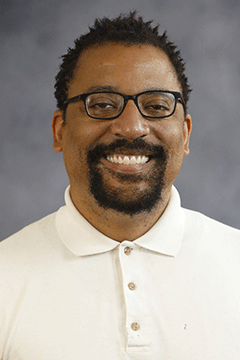 The talk, which is free and open to the public, continues SUNY Cortland’s Black History Month series of events throughout February. Green will discuss the chemistry professors who played an instrumental role in helping him along the way, and the crucial need for visibility and equity of underrepresented people in STEM. “I believe it is important to celebrate diversity in all fields of study, especially STEM,” Green said. “It allows one to see themselves reflected in society, and it breaks down past societal barriers and tropes that paint scientists as only one type of person.” Green’s journey began with his mother in his home city of Detroit, Michigan. A nursing teacher and nurse, she would show him medical encyclopedias and use the photos for reference. “‘Oh, this is where the kidney should be,’” he said, describing the connection his mother drew for him. As he became a cancer survivor, she encouraged him to browse anatomy images and ultimately learn to read full medical encyclopedias. “Of course, I got interested in other scientific areas.” Coupled with his countless experiences with doctors at such a young age and desire to provide the help he had received, he aimed to become a physician. More specifically, a hematologist and oncologist — a cancer doctor for children. Throughout college, his career path switched, and so did his major. After changing from biology to chemistry, Green received his bachelor’s degree from Morehouse College in 2003. There, his organic chemistry professor, Morris Waugh, Ph.D., set an example for him of a Black male scientist and gave him his start in research. “I thought chemistry research was too hard and unobtainable to me,” Green said. “Dr. Waugh saw potential in me and encouraged me to get into research even though I didn’t think I was good enough to be a researcher.” After graduation, Green joined private companies, serving in roles such as quality control chemist and research and development chemist. In 2008, he received an M.S. in biochemistry from Georgia State University. While at Georgia State, Green met another crucial figure in his professional journey: Chemistry Professor Kathryn B. Grant, Ph.D. “She took a chance on me during my master’s studies at Georgia State University and allowed me to work in her lab while I was a working student,” Green said. “Also, she introduced me to DNA and photodynamic therapy, which I still think are the coolest things ever for cancer treatment.” 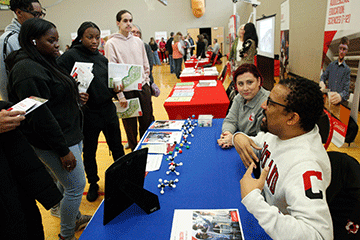 During this time, Green began volunteer outreach work for the Georgia Section of the American Chemical Society (ACS), one of the world’s largest non-profit scientific organizations. Seeing the need for more engagement with underrepresented students and underrepresented professionals, he helped restart the Georgia Section ACS Minority Affairs Committee and became active with the national ACS Committee on Minority Affairs. In 2014, as Green earned a Ph.D. in medicinal organic chemistry from Georgia State University, he worked closely with his Ph.D. advisor, David Boykin, Ph.D., another important mentor. “(He) allowed me the freedom to explore DNA as a drug target, taught me medicinal chemistry, and supported my outreach activities as a graduate student.” Green then moved to Washington, D.C., to continue working in education and advocacy for disadvantaged groups. For four years, he served as the first executive director of Empowerment Enterprise II (EE2), a community-based nonprofit serving youth in some of the poorest and most violent neighborhoods in D.C. After reentering academia full-time in 2019, he served a two-year appointment as a visiting scholar at Bentley University in the Boston area. Green joined SUNY Cortland three years ago as a Diversity Faculty Fellow, part of the university’s participation in the SUNY-wide PRODiG Initiative (Promoting Recruitment, Opportunity, Diversity, Inclusion and Growth). His lab investigates strategies for improving underrepresented student outcomes in chemical education in addition to medicinal chemistry research. He still volunteers in education, outreach and youth advocacy throughout the East Coast. Prepared by communications office writing intern Jean-Andre Sassine Jr. '23 A soundtrack to love gained and lost“The Last Five Years” is ready to prove that the best musicals don’t always need the spectacle of big sets and deafening dance numbers. The show, a collaboration between SUNY Cortland’s Performing Arts Department and Cortland Repertory Theatre, uses basic sets and award-winning songs to tell a bittersweet tale of love lost. The curtain comes up at the Cortland Repertory Theatre’s downtown location at 24-26 Port Watson St. Thursday, Feb. 22, and the show will run through Sunday, Feb. 25. Showtimes are:
Tickets are available at SUNY Cortland’s online Ticket Office, with discounts for seniors, students, faculty and staff. A two-person musical, “The Last Five Years” follows the course of a failed relationship between actor Cathy Hiatt and writer Jamie Wellerstein, starting Cathy’s story at the end and Jamie’s when they first meet. The two alternate songs that reveal their perspectives as they travel through the same timeline in opposite directions. 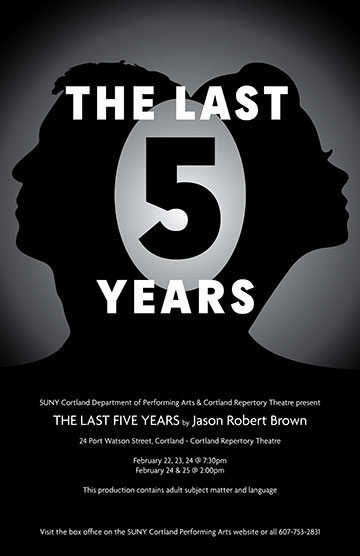 Cortland’s production rotates a cast of four musical theatre major actors, Devin Bethards of Wappingers Falls, N.Y., who graduated last semester and returned for the show, senior Kara Vito of Lynbrook, N.Y., junior Xander Holden of Fort Edward, N.Y., and senior Aria Odendaal of Lebanon, N.J., over the four days of performances. “I’ve really enjoyed working with the whole cast and team," said Vito, who plays Cathy. “They are all so talented and dedicated to fulfilling this show’s potential.” Director Deena Conley, associate professor and chair in the Performing Arts Department, expects the audience to enjoy a relatable story that mirrors real-life relationship struggles set to a soundtrack written by acclaimed writer Jason Robert Brown. “There’s very, very limited dialogue in the show, so it’s a sing-through ... and I just think his music is beautiful,” she said, noting that another show with Brown’s music, “Parade,” recently won the Tony Award for Best Revival of a Musical. Inspired by Brown’s own marriage and divorce, “The Last Five Years” won the Drama Desk Award for Best Music and Lyrics for its Off-Broadway debut in 2002 and was ranked by Time Magazine as one of the 10 best theater releases of 2001. Since then, it’s had multiple revivals, including a 2014 film starring Anna Kendrick and Jeremy Jordan. “It’s been a very unique experience for me,” said Bethards, who plays Jamie. “I’ve never been such a big part in a musical before. I don’t know how many shows even have parts this big. It’s a two-person show so I have the spotlight for 50% of the entire show. Not only that, but while each of us have a scene, we’re usually alone during it. So, there is literally nothing to hide behind.” A rotating cast of four offers unique lessons to Conley and the students themselves. “The actors are really acting with somebody different every night of the performance, which would be another challenge for them, and also for me to make sure that ... all four actors feel ready, no matter what pairing they’re in that night.” The Performing Arts Department decided on a musical with a smaller number of roles after class sizes temporarily decreased due to the COVID-19 pandemic. “Our enrollment numbers are back to where they were pre-COVID,” Conley said. “But we still have these smaller classes of our upperclassmen. And so I thought, with the rest of the faculty, if we’re ever going to do something like this, now is the time.” Due to a licensing issue delay from last fall, the show was rescheduled for the spring semester with CRT’s downtown location as venue. Thanks to the collaboration, the students involved will get a professional credit on their resumes. Black History Month events continueSUNY Cortland's celebration of Black History Month (BHM) continues throughout February with a series of events that include historical and cultural lectures, panel presentations, a Wheel of Fortune-style competition focused on Black history, a formal masquerade ball, and a review of literature featuring a Black Sherlock Holmes. For the remainder of February, BHM campus events will be posted online on the Institutional Equity and Inclusion Office webpage. Events are open to the public and free unless otherwise noted. Event changes may occur throughout the month so please check back for the most up-to-date information. The remaining BHM events include:
Several events are ongoing throughout February.
Co-sponsorships and funding for Black History Month were made possible by the President’s Office, Institutional Equity and Inclusion Office, SUNY Cortland Alumni Association, Multicultural Life and Diversity Office, Student Government Association, Black Student Union, Men of Value and Excellence, the Anti-Racism Taskforce Multi-Media Sub Committee, the Health Promotion Office, the Provost’s Office, Memorial Library, School of Education, New York State United Teachers, and the departments of physical education, English, health, communication disorders and sciences, literacy, philosophy, communication and media studies, sociology/anthropology, economics, sport management, chemistry and kinesiology. For more information, contact Charlotte Wade, assistant diversity officer, at 607-753-2975 or in Miller Building, Room 404A. Lecture to explore empowerment through activityPhysical activity can empower children with disabilities, making them stronger and more confident to navigate the world independently, according to Amanda Tepfer, an assistant professor in SUNY Cortland’s Physical Education Department. “Physical activity can engage participants to not only respond to physical challenges but also engage in problem-solving behaviors that contribute to success in everyday life situations,” Tepfer said. “With the right resources, their opportunities arise so they can engage in after-school sports, recreational activities, activities with their family, friends and their typical developing peers. It opens more doors for them.” 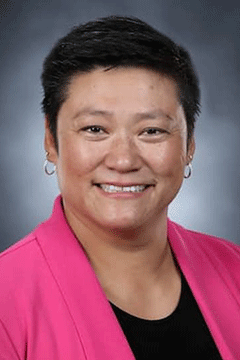 Tepfer will discuss physical activity through the lens of inclusive physical education and sport, on Wednesday, Feb. 21, as part of the 2023-24 Rozanne M. Brooks Lecture Series. Her talk, “Empowerment Through Sport and Fitness,” will begin at 4:30 p.m. in Moffett Center, Room 115. The lecture continues the series’ theme of “The Culture of Power,” which explores humanity’s age-old struggle for power through different lenses. The interdisciplinary talks are free and open to the public. Seating will be limited, so attendees are advised to arrive early to secure a seat. A reception to welcome Tepfer precedes the talk at 4 p.m. in the adjacent Brooks Museum. Since joining SUNY Cortland in 2018, Tepfer has used the university’s adapted physical education community programs, which serve local children with special needs, to help SUNY Cortland physical education majors earn their required hours of fieldwork observing motor development. Local parents have told her frequently that their child with a disability, placed in an adaptive activity setting, has become much more independent overall in life. She’s even seen a few graduates of the adaptive physical education programs progress to engage in Paralympic sports. Since fall of 2022, she has co-directed HealthyNOW, a community program SUNY Cortland has operated since 2010 aimed at fighting childhood and teenage obesity. “Oftentimes, unfortunately, children with disabilities are not given the same access to sports and physical activities as other school-age individuals, youth and adults,” said Tepfer, the course coordinator for SUNY Cortland’s courses in Adapted Physical Education and Sport and Gymnastics in the School Setting. “So, they are often left with the feeling they cannot do these things or that they should not do things,” she said. “As an educator, advocating for them, and teaching them how they can participate and how activities can be modified so they will be able to compete successfully, informs them of what they can do.” Tepfer engaged in working with children with a disability at SUNY Brockport while she earned an M.S. in exercise science, adapted physical education, while also becoming certified to teach adapted physical education. She received her Ph.D. in exercise and sport science with a focus on movement studies in disability from Oregon State University. She worked for private secondary schools in Ohio and New York state, including as a teacher of preschool adapted physical education for 10 years. 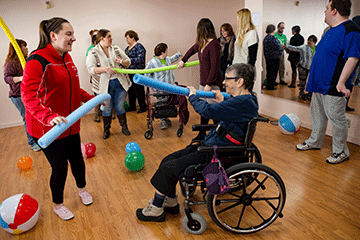 While earning her doctorate, Tepfer was honored in 2013 as the Doctoral Student of the Year by the Adapted Physical Activity Council of the American Alliance for Health, Physical Education, Recreation and Dance. That same year, she was selected to attend the Emerging Scholar Symposium of the National Consortium for Physical Education for Individuals with Disabilities and took part in the International Volunteer Program’s International Symposium of Adapted Physical Activity Conference, Istanbul, Turkey. She is an author and reviewer for Journal of Physical Education, Recreation and Dance and a reviewer for Journal of Visual Impairment and Blindness. Her articles and abstracts have also been published in academic journals including Animals, Adapted Physical Activity Quarterly, Research Quarterly in Exercise and Sport, Palaestra and Journal of Sport and Exercise Physiology. She has presented her research at professional gatherings across the U.S. and in Greece, Italy, Japan, South Korea and Turkey. The remaining Brooks presentations in “The Culture of Power” series are: Tibetan Buddhism, China and the Politics of Tension — Allen Carlson, an associate professor in Cornell University’s Government Department and director of Cornell’s China and Asia Pacific Studies program and advisor of its East Asia Program. March 20. Framing Truth: Exploring Power Dynamics in Documentary Filmmaking — Samuel Avery, an associate professor in SUNY Cortland’s Communication and Media Studies Department and coordinator of Cortland’s annual Blackbird Film Festival. April 10. The Brooks Series honors the late Distinguished Teaching Professor of sociology and anthropology emerita at SUNY Cortland, Rozanne M. Brooks, whose donated special collection of ethnographic objects to the Sociology/Anthropology Department established the Brooks Museum in 2001. The 2023-24 Brooks Lecture Series is co-sponsored by the Cortland College Foundation and Cortland Auxiliary. For more information, contact SUNY Distinguished Professor Sharon Steadman, series organizer and Brooks Museum director, at 607-753-2308. 'Braiding Sweetgrass' author to speakMacArthur Fellow and author Robin Wall Kimmerer, who wrote Braiding Sweetgrass: Indigenous Wisdom, Scientific Knowledge and the Teachings of Plants, will discuss her work on Friday, April 12, at SUNY Cortland. Kimmerer, a SUNY Distinguished Teaching Professor of Environmental Biology at the SUNY College of Environmental Science and Forestry in Syracuse, N.Y., and an enrolled member of the Citizen Potawatomi Nation, will lecture on “The Good Harvest” beginning at 4:30 p.m. in Corey Union Function Room (changed location). The talk continues the campus’ annual yearlong series on the theme of “Food,” presented by the university’s Cultural and Intellectual Climate Committee (CICC), an all-campus committee of faculty and staff appointed by the provost. 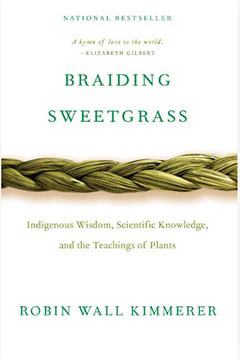 This year, the interdisciplinary series focuses on how sustenance is taken for granted until weather disasters, invasions, wars, supply chain issues or corporate greed place this urgent topic on America’s own dinner table. The 2023-24 “Food” series events are free and open to the public. One feature of each year’s series is a common read book, with a goal to build community through literature. Kimmerer’s Braiding Sweetgrass eBook is available at no cost through the “Library” tab on MyRedDragon. Braiding Sweetgrass offers a series of beautiful and thought-provoking essays in which Kimmerer brings together Indigenous wisdom and practices in Western botany to emphasize and embrace our reciprocity with the natural world. “Braiding Sweetgrass provides us with a new approach to food, showing us that the plants and animals that feed us are not just a source of bodily nourishment, but also our family and our teachers,” said Abigail Droge, assistant professor of English and a CICC “Food” series organizer. “Part of the joy of reading Braiding Sweetgrass in Cortland is also that many of the interwoven narratives that make up the book take place locally in our Central New York landscape.” The CICC organizers have also arranged three Braiding Sweetgrass Book Club readings and a panel discussion on using the work in education:
“There’s something for everyone, whether you’re interested in reading and discussing the book with friends or learning how you might incorporate the book in your own college or high school classrooms,” Droge said. “Most exciting of all, Kimmerer herself will be visiting campus.” Kimmerer, who founded and directs the Center for Native Peoples and the Environment at ESF, was named a 2022 MacArthur Fellow, which is awarded by the John D. and Catherine T. MacArthur Foundation to talented individuals in a variety of fields who have shown exceptional originality in and dedication to their creative pursuits. For more information on this year’s common read, contact Droge at 607-753-4331; or this year’s CICC chair Benjamin Wilson, associate professor and chair of the Economics Department, at 607-753-2436. To submit an event for the “Food” series, volunteer to support this year’s activities and programming, or for more information, visit the “Food” website or contact Wilson. TransAction conference set for March 1The history, current issues and challenges around trans healthcare are the keynote address topics during SUNY Cortland’s sixth annual TransAction conference. Colton M. St. Amand, M.D., Ph.D., a child/family psychologist and physician, will deliver the keynote speech at 11:30 a.m. on Friday, March 1, at SUNY Cortland. TransAction, a conference about the needs and experiences of transgender and gender-queer students in the college environment, will focus on responding to the legal and cultural challenges facing transgender and nonbinary people. 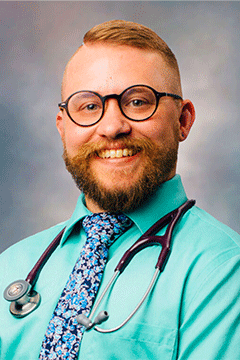 The conference runs from 8:30 a.m. to 4 p.m. in Corey Union and is open to the public. Keynotes and breakout sessions will focus on enhancing and expanding active support for trans students in all education settings. Area community organizations will provide information at tables throughout the event. TransAction participants may register to attend the entire conference or individual sessions. There is no registration fee to attend the conference’s selected breakouts virtually through Webex. Registration also is free for in-person attendance by all SUNY Cortland students, faculty and staff. The in-person registration fee is $12 for SUNY Cortland alumni and $15 for all other participants. The day includes the following guest presentations:
Keynote speaker St. Amand is medical director at the Bassett Healthcare Network’s Gender Wellness Center in Oneonta, N.Y. A licensed psychologist and board-certified family medicine physician, he is an assistant professor in the Psychology Department at the University of Houston and in the Vagelos College of Physicians and Surgeons at Columbia University. They specialize in research, consultation, training and clinical health care treatment related to transgender and gender diverse people of all ages and their families. The author of dozens of published, peer-reviewed articles in the field of gender health, St. Amand was a co-author of the most recent World Professional Association of Transgender Health Standards of Care, specifically the chapter on hormone therapy. They serve as the chief educational officer of Gender U, an online education platform educating providers on caring for transgender and gender-diverse people. St. Amand co-founded Gender Infinity, a Texas-based education and support organization. 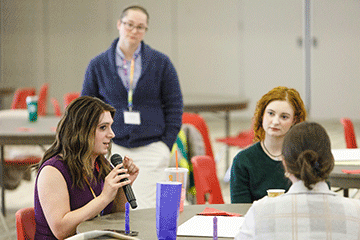 Previous keynote speakers at TransAction include Court Pineiro ’18, a model, artist and writer; Maybe Burke, a New York-based writer, actor and human rights advocate; Harrison Browne, an actor, LGBTQ+ advocate and retired athlete who was the first transgender athlete in professional hockey; Michelle Knaier ’01, M ’03, author, educational scholar and artist; and Becca Barile, Hobart and William Smith’s vice president for campus life and dean of students. The event is sponsored by the Multicultural Life and Diversity Office, grants from Cortland Auxiliary, the Institutional Diversity, Equity and Inclusion Office, the Center for Gender and Intercultural Studies and the Sexual Orientation and Gender Identity Expression Committee. For more information or to inquire about scholarships for those who can’t afford to attend, contact organizer Erin Morris, associate professor of sport management, or visit RedDragonNetwork.org/Transaction.  Suggest a feature story Suggest a feature story
Faculty/Staff ActivitiesGenevieve BirrenGenevieve Birren, Sport Management Department, gave two presentations at the bi-annual Play the Game Conference held Feb. 4 to 7 in Trondheim, Norway. Both were on anti-doping in sport. The first was “Social media use in doping prevention and enforcement” and the second was “The Rodchenkov Anti‐Doping Act: The United States’ newest approach to doping control.” Catherine Porter LewisCatherine Porter Lewis, professor emerita of French, received the Albertine Translation Prize honoring the best contemporary French and Francophone literature in English translation. The award recognized her translation of Philippe Descola’s nonfiction book Les formes du visible. Une anthropologie de la figuration. The Albertine Prize, co-presented by Van Cleef & Arpels and the French Embassy, recognizes American readers’ favorite French-language titles recently translated into English. The ceremony was held Jan. 25 at the cultural services of the French Embassy in New York City. Gigi PetersonGigi Peterson, History Department, co-taught the graduate class “Migrations in US History, Literature, and the EFL Classroom” with Professor Dr. Britta-Freitag Hild at the Universität Potsdam, Germany, in November. They have been collaborating since early 2020 and in Fall 2024 Freitag-Hild will visit SUNY Cortland as part of new exchange opportunities between the two campuses.  Submit your faculty/staff activity Submit your faculty/staff activity
In MemoriamD. James "Jim" Forshee a lecturer in the Sport Management Department, died Thursday, Feb. 15, 2024, after a brief and sudden illness. Calling hours will be held Thursday, Feb. 22, from 2 to 6 p.m. at Wright-Beard Funeral Home, located at 9 Lincoln Ave. in Cortland. The family encourages those who attend visiting hours to wear Cortland High School or SUNY Cortland shirts or colors, representing his love for both institutions. A message from President Erik J. Bitterbaum is posted on the SUNY Cortland website. |
The Bulletin is produced by the Communications Office at SUNY Cortland and is published every other Tuesday during the academic year. Read more about The Bulletin. To submit items, email your information to [email protected]
© 2026 SUNY Cortland. all rights reserved.
